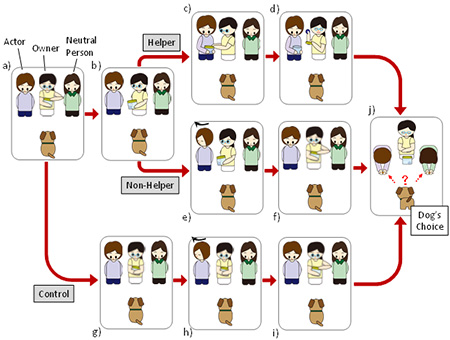
Dogs are extremely sensitive to social signals from humans. For instance, they quickly stop trusting actors who send deceptive signals (Takaoka, Maeda, Hori, & Fujita, 2015). In this situation, the dogs clearly benefit themselves by doing so. In the present study, we tested how dogs evaluate human agents in a situation irrelevant to their own benefit. Dogs watched three people in the following scene: The owner, sitting in the middle, attempted to open a transparent container to get a junk object that was of no value to the dog. After unsuccessful attempts, the owner requested help by holding the container towards one of his/her neighbours. In the "Helper" condition, this actor supported the container with both hands and the owner succeeded to remove the lid and picked up the object inside. In the "Nonhelper" condition, the actor refused to help by turning away and the owner failed to remove the lid. In the "Control" condition, the owner did not request help but briefly stopped working while the actor spontaneously turned away for no explicit reason. The owner failed to remove the lid. In all conditions, a neutral person was sitting on the other side of the owner. After these interaction sequences, the actor and the neutral person simultaneously offered identical treats on their palm to the dog. The results showed that the dogs' choice of the two people was random in the "Helper" and "Control" conditions. However, in the "Nonhelper" condition, it was significantly biased against the actor; they reliably took food from the neutral person more often than the nonhelpful actor. This suggests that dogs evaluate people by watching their interactions with the owner and that they avoid people who behave negatively to the owner. This is the first report that dogs make affective social evaluation in a situation that would not immediately benefit themselves (Chijiiwa, Kuroshima, Hori, Anderson, & Fujita, 2015).
Background
Dogs are the oldest domesticated animal and are called "humans' best friend." Through the long history of cohabitation, dogs became extremely sensitive to human behaviour. They catch a slightest sign of their owner preparing for a walk and they bring the leash. They also sit and wait before the owner prepares their meal. In these situations, they behave as such because of their own expectation of impending benefit.
Now the question is how much dogs attend to human behaviour in situations irrelevant to their own immediate benefit. We humans pay much attention to others in such situations. For example, we feel negatively toward people who refuse to offer their seat to old people in the train, whereas we appreciate people who help lost strangers to find their way.
Do dogs share the same ability with us? In the present study, we asked whether and how dogs evaluate people who help or refuse to help their owners solve a problem; ie, from a third-party viewpoint.
Method and results
We divided 54 house dogs into three groups of 18. The dogs observed interactions between their owner and the experimenters (Figure). Each group participated in one of the following conditions.
a) "Helper" condition. The owner tried to remove the lid of a transparent container to get a junk object of no value to dogs (vinyl tape). After 8-10 sec of unsuccessful attempts, the owner asked one of the experimenters (the actor) sitting next to him/her for help. The actor helped the owner by supporting the container with both hands. The owner then succeeded to open the container, picked up the object from inside, cheerfully showed it to the dog, then returned the object to the container and put the lid firmly back on.
b) "Nonhelper" condition. The owner acted in exactly the same manner until he/she asked the actor for help. However, in this condition, the actor explicitly refused to help the owner by turning away. The owner continued trying but did not succeed.
c) "Control" condition. The owner acted in exactly the same manner for 8-10 sec, then stopped working for 1-2 sec, during which the actor spontaneously turned away. The critical difference between this condition and the "Nonhelper" condition was the absence of any requesting gesture by the owner.
In all of these conditions, another experimenter (a neutral person) remained sitting on the other side of the owner, looking down at the floor throughout the interaction. After completing the interaction, the actor and the neutral person offered the dog an identical treat on their palm at the same time. Nobody looked at the dog, to exclude any inadvertent clues. We recorded which experimenter -- the actor or the neutral person -- the dog chose. The dogs obtained food irrespective of their choice. Each dog was tested 4 trials of the same condition. The left/right position of the experimenters was counterbalanced in random order.
The results showed a significant difference in the choice patterns by dogs across the three conditions. The dogs' choice was random in the "Helper" and "Control" conditions, whereas it was significantly biased against the actor in the "Nonhelper" condition. That is, the dogs avoided the actor who refused to help their owners.
This choice was unlikely to be related to any benefit to the dogs because what the owners were trying to get was a junk object of no interest to the dogs, and they obtained food irrespective of their choice of experimenter. Thus the dogs avoided a nasty person by affectively evaluating third-parties in a situation irrelevant to their own benefit.
In humans, such third-party social evaluation leads to a benefit for prosocial agents through the formation of reputation (indirect reciprocity). Human societies work upon cooperation. Those who do not cooperate are less likely to survive because they are seldom helped. Thus, such third-party evaluation of others is a key feature in the establishment and maintainance of collaborative human societies.
Some previous studies have shown that chimpanzees like to stay near a person who is willing to give food to others (Subiaul, Vonk, Okamoto-Barth, & Barth, 2008). Similar choices have been shown in dogs (Kundey, De Los Reyes, Royer, Molina, Monnier, German, & Coshun, 2011; Marshall-Pescini, Passalacqua, Ferrario, Valsecchi, Prato-Previde, 2011). But these results can be accounted for by the animals' seeking the best opportunity for immediate benefit. The only nonhuman species shown to engage in third-party evaluation in situations irrelevant to their own immediate benefit is tufted capuchin monkeys, in our previous studies (Anderson, Kuroshima, Takimoto, & Fujita, 2013; Anderson, Takimoto, Kuroshima, & Fujita, 2013); this species is highly intelligent in the social domain and highly cooperative.
In the present study, we found only avoidance of non-cooperative agents by dogs; there was no preference for cooperative people. This negativity bias is reminiscent of what have been shown in 3-year-old human children and tufted capuchin monkeys. The same bias observed among distantly related species might imply that cooperation is an inherent tendency of these species. At the same time, it shows that this affective function may be homologous among these species.
Ripple effects
Large-scale collaborative societies are characteristic of humans. Third-party evaluation is an important factor supporting this phenomenon. The present study showed that this ability is shared in dogs, and thus not necessarily related to phyletic closeness with humans or competence for language. Instead, it is associated with affective functions accompanying well-developed social competences, and it may be automatic rather than conscious. This challenges the notion that evolution of human-like collaborative societies depends on this uniquely human ability. This study provides new material for drawing an evolutionary sketch of collaborative societies.
The present study also shows that affective characteristics of dogs are remarkably similar to ours. Our most important companions surely have more complex affective functions than the fundamental emotions such as happiness and anger. It persuasively shows continuity between their kokoro (mind and heart) and ours. This information is also useful for establishing desirable relationships between humans and dogs.
The negativity bias observed in the present and previous studies suggests that cooperation, or mutual helping, may be an original feature of highly social species like humans, monkeys, and dogs. This provides an important philosophical issue concerning human nature.
Future orientations
We found a negative affective evaluation of people who did not help others. In later ontogenetic development, we humans come to show positive evaluation of those who are helpful. Thus one of our next projects is to test whether such positive affective evaluation occurs in modified situations. Evidence for positive evaluation would strengthen the case for the homology of third-party evaluations by dogs and humans. Spontaneous, not requested, help may provide such a situation.
A second future question may be whether the social evaluation also occurs toward dogs. Testing this possibility would reveal whether this ability of dogs is restricted toward humans because of their symbiotic history, or a more generalized social ability.
A third question is whether species capable of third-party social evaluation may change their behaviour in the presence of others. This is an important step for third-party evaluation to lead to reputation formation and collaborative societies.
A final question is how widespread this ability is in the animal kingdom. This is important to clarify the evolutionary history of this social ability.
This study was financially supported by the JSPS Grant-in-Aide for Scientific Research (A) to K.F., No. 25240020, and that for Priority Areas No. 25118002.

Figure: Sequence of interactions in the "Helper" (top), "Nonhelper" (middle), and "Control" (bottom) conditions.
Paper Information
[DOI] http://dx.doi.org/10.1016/j.anbehav.2015.05.018
[KURENAI Access URL] http://hdl.handle.net/2433/198493
Hitomi Chijiiwa, Hika Kuroshima, Yusuke Hori, James R. Anderson, Kazuo Fujita
"Dogs avoid people who behave negatively to their owner: third-party affective evaluation"
Animal Behaviour , Volume 106, August 2015, Pages 123–127





